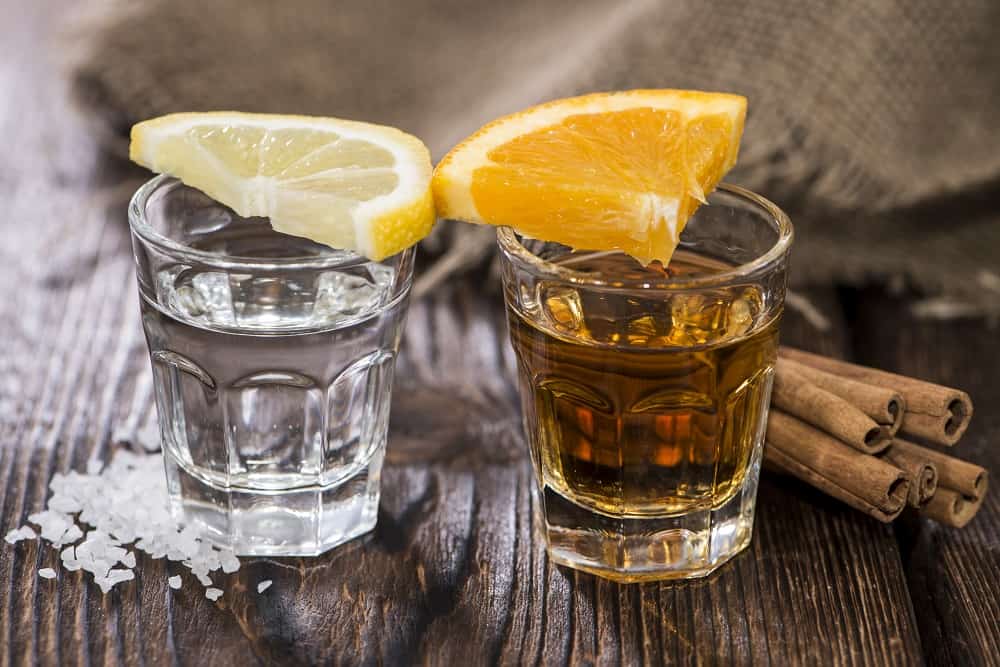Tequila is a popular alcoholic drink that is specifically made from an agave plant. According to Mexican laws, tequila can only be produced in the state of Jalisco and a few other municipalities – a geographic designation of origin that more than 40 countries recognize. While mezcal is the general term for alcoholic drinks produced from agave plants, tequila is specifically made from the blue agave plant, Agave tequilana.
Since tequila is derived from a plant source and is processed without the involvement of any animal product or derivative, tequila is perfectly appropriate for people with vegan diets. Some tequilas are made of 100% agave sugars, but laws allow tequila to be made of up to 49% of other sugars. However, the typical other sugars used are also vegan such as cane sugar, cane molasses, and such.
Table of Contents
Tequila History

It is believed that tequila comes from the ticuilas tribe that once inhabited the hillsides near the city of Tequila (1). Another possibility is that the alcohol came from the Nahuatl word tequitl and the word tlan which combined means “the place where work is done.” The oldest evidence of the use of agave plants in Mexico comes from codices obtained from ancient Spaniards who have observed certain tribes cook agave plants and use them to compensate for the lack of water.
The general name for all species of agave was ‘metl’ which is the root for mezcal which refers to any alcoholic drink produced from agave. However, tequila refers to mezcal that is specifically produced from the blue agave plant or Agave tequilana. There were only two major regions associated with tequila production: the Tequila region and the Jalisco Highlands. Back then, consumers were primarily the inhabitants of Mexico and the first casks exported out of Mexico was to the US around the end of the nineteenth century.
Tequila Production
The first step in tequila production is the harvest and delivery of agave to the tequila factories. Although the agave plants have already been inspected before harvesting, the plants are further inspected for damage upon arrival. The agave is then cut to facilitate cooking and be easier to handle. Cooking is supposed to achieve three things: the high temperature and the low pH helps release the sugars, some sugars get caramelized which contributes to the aroma and taste of the tequila, and the cooked agave makes it easier to process further.
The cooked agave is then milled to obtain the juice which is then collected for fermentation. Milling agave has gone through different stages throughout the years as tequila production used to use large stone wheels and even animal-driven machinery to mill the agave. However, modern techniques include passing the cooked agave through a cutter with a milling combination.
If the tequila is made with 100% agave, then the juice obtained from the milling process is mixed with water which is then used for fermentation. However, since tequila can be made with a mixture of other sugars for economic purposes, this is the stage where companies mix the agave juice with other sugars. Due to cost efficiency, there are only four different sugars used in tequila production: cane sugar, piloncillo, cane molasses, and corn syrup. These sugars can make up to 49% of the total solution.
At this step, tequila production follows a typical alcohol production pathway wherein the sugar wort solution is then allowed to ferment. Some companies use a specific strain of yeast, Saccharomyces cerevisiae, while some companies just allow the sugar wort solution to ferment naturally. The product of fermentation is then distilled, cleaned up, and allowed to mature for at least two months for rested tequila and twelve months for aged tequila.
Is Tequila Vegan?
With many alcoholic beverages - like vodka - the processes involved are highly similar and most, if not all, do not really include animal products or derivatives. As with the case for tequila, the alcoholic beverage is completely vegan since it is exclusively derived from the blue agave plant and the processes involved in its production do not include anything from animals.
However, different companies might include different additional ingredients to develop unique tastes and flavors in their tequila products. It is not uncommon for these companies to include other botanical ingredients for different flavor profiles. It is important to always check the ingredients list as there could be some non-vegan ingredients included such as honey. Cocktails that use tequila are also not automatically vegan since there could be some non-vegan ingredients added.
References




